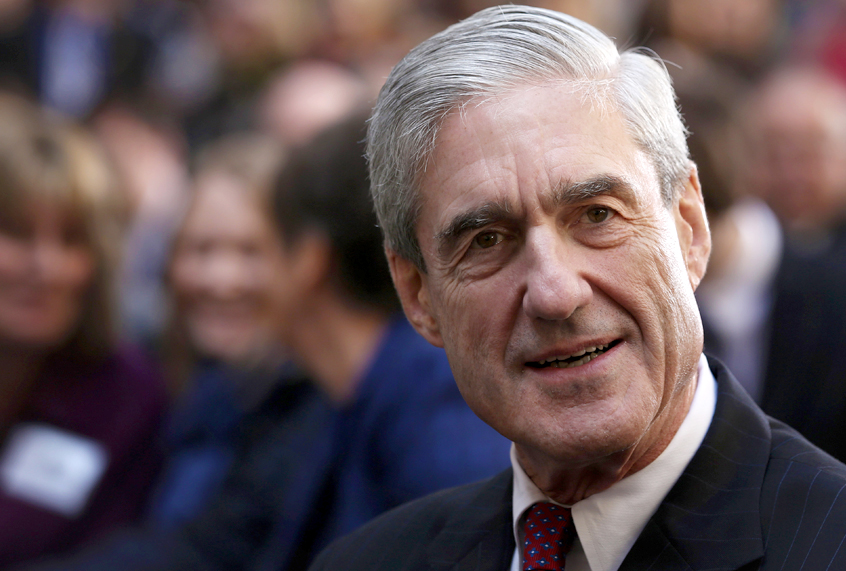 President’s Trump’s impromptu remark that he is willing to speak “under oath” with special prosecutor Robert Mueller can be read as a sign of his “preternatural confidence,” or proof that he is a “nightmare” client. But that would miss the point.
President’s Trump’s impromptu remark that he is willing to speak “under oath” with special prosecutor Robert Mueller can be read as a sign of his “preternatural confidence,” or proof that he is a “nightmare” client. But that would miss the point.
The reckless offer — quickly walked back by his attorney Ty Cobb — also has a practical purpose: to flesh out the anti-Mueller conspiracy theory being hyped by Lou Dobbs, Senator Ron Johnson and the bot-assisted #ReleaseTheMemo chorus on Twitter claiming Trump is the victim of a deep-state “secret society” in the FBI.
“I would love to do it, and I would like to do it as soon as possible,” Trump said, about talking to Mueller, only to be corrected hours later by his attorney.
‘He’s ready to meet with them, but he’ll be guided by the advice of his personal counsel,” Cobb said.
It’s tempting to focus on Trump’s possible performance as a witness. One lawyer who took a deposition from Trump forced him to admit 30 lies. Cobb preemptively expressed the hope that Mueller would not set a “perjury trap.”
Loose talk from Trump could strengthen the case that he obstructed justice, already a focus of Mueller’s investigation. Presidential perjury might even find its way into a bill of impeachment. Trump supporters on Twitter and Fox News warned him not to make good on the offer.
It’s also tempting to say the GOP’s conspiracy theories are “loony.” The Republican charges of a “secret society” inside the FBI are based on a single textsent by an FBI lawyer, who has since been removed from Mueller’s team. The text has “no apparent tie to other messages sent before or after it.”
The insinuation that FBI director James Comey sought to block Trump’s election is ludicrous. When Comey resurrected the non-issue of Hillary Clinton’s email server on the eve of the 2016 election on the flimsiest of pretexts, Trump defended him for what he said was an overdue action.
But the most important point is that Trump’s role in this psychodrama is not factual or legal, but theatrical.
Trump’s insincere offer to talk to Mueller provided both. It confirmed to his supporters that “he knows he’s done nothing wrong,” and provided a talking point for future use: what Mueller calls obstruction of justice is just self-defense.
Asked if he thought the special counsel would be fair to him, Trump said, “We’re going to find out.”
REPORTER: Are you concerned about it?
TRUMP: Because here’s what we’ll say, and everybody says: No collusion. There’s no collusion. Now they’re saying, Oh, well, did he fight back? Did he fight back? You fight back, Oh, it’s obstruction. So, here’s the thing: I hope so.
‘Fundamental cleansing’
And how should the supposedly innocent president fight back?
Trump has already purged three of the five top FBI officials while putting such pressure on FBI director Christopher Wray that he offered to resign.
On Wednesday, Fox Business host Lou Dobbs, whom Trump has “loved for years,” declared the Justice Department needs a “fundamental cleansing.” He urged Trump to reappoint former judge Mike Mukasey as attorney general. (Mukasey served as attorney general in the last year of the Bush administration.) This is a proverbial “trial balloon,” of which we will likely hear more of shortly.
On cue, Mukasey appeared Thursday on Brian Kilmeade’s Fox New show to explain the need for such an investigation.
“If you are doing an investigation,” Kilmeade asked, “are you allowed to go get the agents’ phones?”
Mukasey said phones could be taken as evidence.
“How do you pursue the investigation the right way?” Kilmeade asked.
“Keep pulling on the threads and see where it leads,” Mukasey said.
As for allegations about a secret society, Mukasey said he doubted there was any such formal group, but added that, “somebody should figure out whether they met and what they talked about.”
Somebody, perhaps, like Mike Mukasey.
What’s next?
Trump remains frustrated and furious that Jeff Sessions recused himself from the Russia investigation early on, which means Sessions can’t fire Mueller, even if Trump ordered him to.
Authority over the special prosecutor now rests with Deputy Attorney General Rod Rosenstein, a career Justice Department employee, who continues to stand by Mueller.
Replacing Sessions with Mukasey would not only enable Trump to open an investigation of the FBI in the name of fighting “corruption,” it would spare Trump the need to fire Rosenstein (and possibly other Justice Department officials) to get rid of Mueller.
Trump’s offer to speak to the special counsel was neither bluster nor blunder — it was preparation for the coming “cleansing” of the Justice Department demanded by Republican conspiracy theorists and sought by the endangered president.

